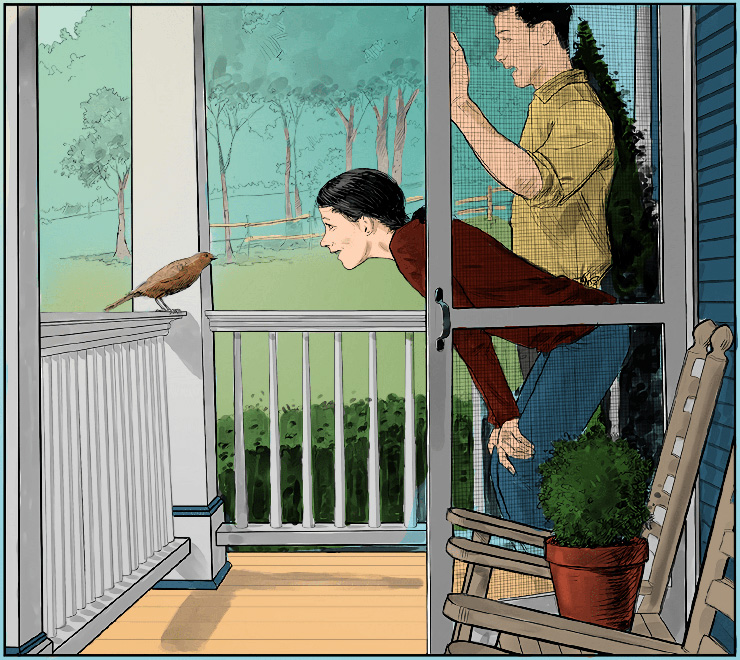Read by Michael Flamel
Blessed with the luck and luxury of a backyard, Pierrette and I found ourselves spending quite a bit of time outside last summer. Pierrette gardened with her usual energy, and I pitched in when I had to—or wandered away to check out the wildflowers.
Oh, and we watched birds. One morning we spied, hopping through a patch of vinca minor, a harried, put-upon mama sparrow pestered after and piped at—Feed me! Feed me!—by a young bird already bigger than she was. The beleaguered mama was definitely an English sparrow, but the pesky fledgling? We turned to our bird books, but had no luck: the fledgling was brownish-gray and nondescript, the kind birders refer to as an LBJ—a Little Brown Job. (The counterpart for wildflower people is the DYC—the Damn Yellow Composite.) So we redoubled our research (that’s code for jumping on the internet and typing in bird feeding bigger bird) and we discovered…brood parasitism. Seems that certain species of birds—the European cuckoo is the classic example—have this unsavory habit of laying their eggs in the nests of other birds, who are then stuck raising the interloper. But here in the Northwest U.S., the fledgling was most likely a brown-headed cowbird (Molothrusater artemisiae). Incidentally, we learned there’s a South American species known as the screaming cowbird. This fledgling seemed obnoxious enough.
So now we knew, knew something, anyway. We might have left it at that, but one morning as we were going out the door, we spotted the fledgling lying—well, perching—in wait on the back porch. She was alone (we’d decided she was a she, judging as best we could) and she perked up after spotting us, and then edged away. Then she edged back again, peeping.
We were perplexed. I said, “So just what do you want, you weird little bird?”

Had the stepmama sparrow taken off for parts unknown, unceremoniously dumping the changeling? Well, who could blame her?
“Is she looking for another mama, or what?” Pierrette asked. I crouched down and offered a sunflower seed. But that bird wasn’t interested in the seed, or me, at all. Instead, her beady little gaze lit up when she turned to Pierrette, and she fluffed herself into a rounded, more juvenile appearance, adopted her most appealing manner, and chirpingly pleaded her case.
Pierrette found this sort of endearing, if mystifying. Still, she was not willing to catch bugs or regurgitate any sort of a treat for a bird, no matter how ingratiating.
The fledgling kept hanging around, and I said, “Let’s name her Cow Bell.”
Pierrette said, “Oh, no, she’s definitely not a Cow Bell. She might be strange, but she’s sort of a sweetie pie, I think. We should call her…Cow Pie.”
We learned another thing about cowbirds: when they’re grownup birds—or when they’re taking their first trembly steps in that direction—they follow cows around, hence the name. The cows stir up the bugs, and the cowbirds eat the bugs, neat and sweet. But, of course, cows are rare in our neighborhood.
As I’ve mentioned, Pierrette is an energetic gardener. One day when she was managing a row of radishes, moving right along, we saw a bug jump frantically out of her way, only to be pounced upon by the trailing Cow Bell/Pie. Pierrette said, “Hmm, I don’t know if I’m really all that flattered by this.”
I understood. I mean, who wants to be a surrogate Guernsey?
But that bird—we finally compromised and called her Cowie—appreciated Pierrette. She’d flutter after her and sometimes alight on her back when she was gardening on all fours. Maybe Pierrette was assuming the quadruped position, from Cowie’s point of view, and Cowie was hunting for ticks or cooties. (Pierrette denies that she has either.) Sometimes Cowie would land on Pierrette’s head, as though contemplating a nest in her generous cloud of curls. We did worry about entanglement, but Cowie was nothing if not a survivor.
Still, one gray day it happened: Cowie came no more. There was No More Cow Bell. Cow Pie had Hit the Trail. Maybe she’d finished refining her foraging moves and grown up at last. Maybe she went looking for a flock of her own kind. Pierrette said, “Maybe she’s out there looking for a real cow.”
We did worry. I mean, how would Cowie know what a cow looked like? What if she’d cozied up to Sheba the Cat, the alpha predator of our neighborhood?
But we’re hopeful: Cowie did seem to be a survivor. Maybe she’ll come back for a visit someday, remembering how she and Pierrette had been a team, rolling along with the great wheel of nature in the backyard, negotiating symbiosis. ❖


 Previous
Previous


What a sweet memory it brought back to me. Back in Ohio as a young gardener following my Mom around in her tomato garden one day, I noticed a brown fledgling quivering and flapping its wings like a hungry baby bird. I picked it up and put it in a shoe box. My brother, who was knowledgeable about birds, informed me that it was a Cow Bird that had been shoved out of its too small nest. Hence, it was now my responsibility to feed it….’cause I picked it up. So, we found bugs for it…fed it to the point that it eventually went out on its own. Periodically, it would return to perch on the railing of our back porch for a visit. Then it no longer returned ….except one day with a whole flock of brown birds flapping for food!
That is a great memory. Thank you for sharing!
That’s awesome! It’s amazing how animals adopt us. I have a bunny with a bunch of babies currently in my yard. I’ve been protecting them like they were my own. They are so cute!